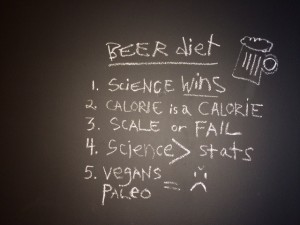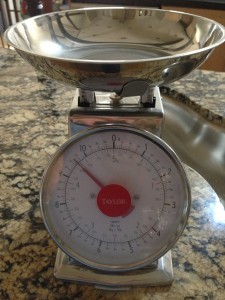The “Beer Diet” – I’m the doctor that supervised Evo Terra as he spent every October for the last three years drinking beer and eating sausages – and while doing this lost weight, lowered his cholesterol, lowered his body fat, and lowered his C-reactive protein and blood homocysteine levels (measures of the body’s inflammatory response).
Here are the Five big lessons we have learned from this experiment:
(1) Science Rules
No matter what you wish to say, there is nothing like a scientific experiment to prove if something works or not. This was not a “fad” diet, this was a carefully controlled experiment, where the conditions were controlled and his blood chemistry was examined on a weekly basis as well as his body measurements. Doing this experiment still shows that what we think we know, when placed to the test, may not stand the test of science.
(2) A Calorie is still a Calorie
1500 calories a day for Evo would predict weight loss – and it did. He lost weight while drinking 6 beers a day and eating sausages — total caloric intake was 1500 calories a day. In fact, he lost more weight than would be predicted by the calorie model. Did those calories just disappear into thin air? Evo is not immune from the laws of physics, but what a person does with the calories is every bit as important as the calorie itself. While his body consumed 1500 calories on average, his body didn’t use them all – some were used by bacteria inhabiting his gut, some were not absorbed and passed on. He clearly didn’t store any calories.
(3) Scale or Fail

Weighing food helps you know how much you are eating. It is part of science-
Evo was very careful about his calorie intake. He weighed his sausages, and he knew precisely how much sausage he was going to eat. This was not unlimited sausage and beer diet, this was portion controlled – calorie controlled experiment.
In over 20 years of weight loss successful patients follow the dictim “use the scale to measure what I eat or fail because my eyes will overcome me.” This is balanced against people who say they eat “unlimited” amounts of “fats and meat” or unlimited amounts of “raw vegetables.” The raw vegetables are more easy to understand – it is difficult to get the calorie requirement if you eat a lot of vegetables and even fruits. A cup of blueberries is 85 calories. One cup of chopped broccoli is 31 calories. But a 12 ounce New York strip steak has over 500 calories. I don’t think someone will eat a three steaks a day- but if that was all you ate, you would have about 1650 calories, which is less than most people will burn. In my book “Losing the Last 30 pounds” I noted that most diets that say you can have something unlimited really gets translated to “you are going to get sick of eating this, and when you get sick of it you will eat less.” The science of this is your palate is overwhelmed with a single flavor and you tend to eat less of it. So you can start out eating steak every night on an Atkins diet and after a month you won’t ever want to see a steak again.
I can report, that Evo is not tired of beer – he still loves a wide variety of high quality craft beers – but the flavors are different in each of those beers, so his palate is not overwhelmed. He was happy to give up sausages for a bit.
(4) Science beats Statistics
You have heard “processed meat is bad for you” or that if you drink beer you will get a “beer belly.” Some of that is based on large population studies where they look at the disease of the groups as they divide them up into what they have eaten. A statistical analysis is done and the conclusions are made that “red meat is bad for you” or “processed food is bad for you,” or “beer is bad for you if you drink more than a couple at a time.” Those statistics are not a science experiment – where you take an individual- and under controlled conditions see how their body reacts to what they eat. We have those conditions.
Here is the other problem with lots of those population studies: they are making a guess as to how much meat they ate, or sausage, or if they even know what processed food is, then they are hopeful that they know what people will die or suffer from and try to correlate it back to the bad data entry. In this case, we were certain what he ate, and we were certain how much he ate, and what he drank. We were also certain how his body reacted to them.
(5) Vegans and Paleo will never be happy unless you do it their way

Early paleo man was often reminded to not bring in that old wooly mammoth – it stunk up the cave. She would have been happier had he brought in beer and sausage (at least beer until football was invented)
Physicians who have a bias to eating vegan or by eating like a caveman were the most skeptical of this data. Vegans say “well the beer is ok, not great, but at least it isn’t processed meat.” Paleolithic dieters say “the sausage is ok, because it is meat, but the beer can lead to beer belly because it will increase insulin production.”
Both groups of physicians would tell me that this diet is dangerous, and that Evo’s blood levels of (pick your favorite lab value) would increase. We checked his blood chemistry for all of the indicators you could imagine. None of them increased – in fact, all of them decreased. One of my vegetarian friends, and fellow physician, who is writing a book about why vegetable protein is the only way to go- said that just wait, and things will get worse. It has been three years – and it seems every time Evo gets on the diet his blood levels , cholesterol, C-reactive protein, homocysteine went down.
I follow a number of physicians on Twitter. When they tweet about science reports, they always tweet about the reports that confirm their bias. My fellow paleo doctors always tweet about the latest study from Sweden showing how saturated fat isn’t bad for your diet, and my fellow vegan physicians always show the latest study that saturated fat is bad for you.
Does this provide any definitive answer to those questions? No- it does not. People are as varied as can be, and how each of our bodies reacts to food depends a great deal on our genetic make-up. You know that thin person who can eat all the junk in the world and not get beyond 95 pounds. Or the person with celiac disease, for whom gluten laden products leads to illness. One person can eat a bag of peanuts without difficulty, and another person is killed by eating one peanut. This does not mean peanuts are bad for you or gluten is bad for you – unless you have those conditions.
ONE FINAL NOTE (from the legal staff of Dewey, Chetum, and Howe): this was an experiment done under controlled conditions, with an informed patient, a surgeon, and a lot of lab work. I am not advocating or advising this diet- because there was more to it- this is just an observation and reporting of an experiment